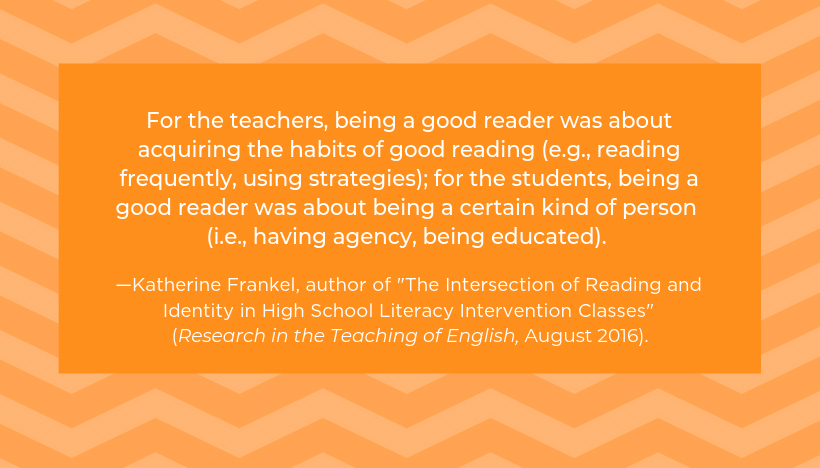This post was adapted by NCTE member Katherine Frankel from her article “The Intersection of Reading and Identity in High School Literacy Intervention Classes” (Research in the Teaching of English, August 2016).
I just bought this book [Confessions of a Serial Kisser] . . . . It’s just about this girl trying to figure out who she is, going to high school, just kissing all the other boys cuz she read a lot of books . . . talking about love and stuff and she just trying to figure out who she is, and the whole book is just trying to find out who she is in high school. . . . I can relate to it, like I’m in high school. . . . It was just an interesting book. —Excerpt from Dennis’s book talk
In my research, I have sought to understand how youths are positioned as readers in classes designed to improve their reading by focusing on their acts of agency in these contexts. By agency, I mean the ways that youths shape the storylines of their classrooms in ways that are (or are not) recognized and sanctioned by their teachers. The quote above is from a book talk by a ninth grader named Dennis (all names are pseudonyms) in the context of his literacy class.
Dennis’s class, like many literacy intervention classes, was a compulsory year-long course assigned to him during his first year of high school.
While previous studies of these classes have focused on students’ acquisition of reading skills and strategies, in this article my purpose was to understand how students themselves experienced them. In this post, I share my findings from an analysis of two students’ acts of agency in their literacy classes. Specifically, I show how the students’ existing identities as readers did not align with the official storylines of their classrooms because those storylines positioned them as readers in need of improvement.
Agency, Identity, and Positioning
Using sociocultural theories of identity (the idea that identities are fluid and socially, culturally, and historically situated; Holland, Lachicotte, Skinner, & Cain, 1998) and social psychological theories of positioning (the idea that individuals position themselves and are positioned by others through social interactions; Davies & Harré, 1990), I analyzed student and teacher interviews, researcher field notes, and classroom artifacts for two students and teachers in different classrooms.
In one classroom the student-teacher pair included Dennis, an African American male student, and Mr. Taylor, his White male teacher. In the other classroom the student-teacher pair included Tory, a White female student, and Ms. Cheung, her biracial (Asian/White) female teacher. In my analysis, I focused on the two students’ acts of agency.
Dennis’s and Tory’s Acts of Agency: Challenging and Acquiesing to Official Storylines
Dennis and Tory were discursively positioned as “struggling readers” through their placements in literacy intervention classes despite both holding positive views of themselves as readers.
However, they responded differently to this positioning. Dennis engaged in improvisations that challenged the norms of his classroom, for example, by contesting the basis of his placement in the class, correcting other students’ reading, and questioning classroom activities. Simultaneously, Dennis also engaged in other kinds of practices such as seeking to improve his grade in the class by reading more, engaging in class discussions about strategies he used in his own reading, and discussing books he enjoyed.
In contrast, Tory engaged in improvisations where she acquiesced to the norms of her classroom, for example, by contributing to classroom discussions despite claiming no knowledge of reading strategies, volunteering to read and discuss a book despite a stated dislike for it, and communicating her lack of interest in the class to her peers. Tory also engaged in other practices such as aligning herself with other perceived “good readers” in the class.
Dennis’s and Tory’s different responses to similar acts of positioning were shaped by the institutional constraints of the classes as well as their and their teachers’ understandings about what it meant to be a reader.
For the teachers, being a good reader was about acquiring the habits of good reading (e.g., reading frequently, using strategies); for the students, being a good reader was about being a certain kind of person (i.e., having agency, being educated).
Implications
Ultimately, these findings point to the limitations of remedial reading classes for adolescents by problematizing the practice of placing students in classes that position them as deficient.
Although both teachers were experienced and thoughtful educators with clear rationales for their instructional approaches grounded in their individual understandings of readers and reading, the policies and practices of placement and instruction in both classes conflicted with Dennis’s and Tory’s histories and identities as capable readers.
Moreover, subsequent analyses of the experiences of other students in these same classrooms indicated that, for two different students who believed themselves to be poor readers, both classes had the further consequence of “thickening” their identities as readers in need of improvement (Frankel, 2017).
Future Directions
Based on this work, I believe it is imperative that literacy teachers, teacher educators, and researchers continue to ask the tough questions that will help the field to better understand the potential consequences of particular approaches to literacy instruction for students.
Some of these questions include:
- How might we (as teachers, teacher educators, and researchers) interrogate our own understandings of what it means to be a reader, particularly in relation to our students’ understandings about literacy and about themselves as readers and writers?
- How might we transcend curricular constraints and institutionally sanctioned instructional practices to better account for and build from students’ acts of agency?
- How might we disrupt the trend of placing students in classes that position them as deficient and, instead, focus on developing processes for partnering with youth, families, and communities to better understand the rich literacy repertoires of the young people in our classrooms?
References
Davies, B., & Harré, R. (1990). Positioning: The discursive production of selves. Journal for the Theory of Social Behavior, 20(1), 43–63.
Frankel, K. K. (2017). What does it mean to be a reader?: Identity and positioning in two high school literacy intervention classes. Reading & Writing Quarterly: Overcoming Learning Difficulties, 33(6), 501-518.
Holland, D., Lachicotte, W., Skinner, D., & Cain, C. (1998). Identity and agency in cultural worlds. Cambridge, MA: Harvard University Press.
Further Reading
Read the full article “The Intersection of Reading and Identity in High School Literacy Intervention Classes” (Research in the Teaching of English, August 2016).
For additional research on the topics of literacy instruction and intervention, identity, and positioning, see also:
Brooks, M. D., & Rodela, K. C. (2018). Why am I in reading intervention? A dual analysis of entry and exit criteria. The High School Journal. 102(1):72-93.
Frankel, K. K. (2017). What does it mean to be a reader?: Identity and positioning in two high school literacy intervention classes. Reading & Writing Quarterly: Overcoming Learning Difficulties, 33(6), 501-518.
Frankel, K. K., Fields, S. S., Kimball-Veeder, J., & Murphy, C. R. (2018). Positioning adolescents in literacy teaching and learning. Journal of Literacy Research, 50(4), 446-477.
Hall, L. A. (2010). The negative consequences of becoming a good reader: Identity theory as a lens for understanding struggling readers, teachers, and reading instruction. Teachers College Record, 112(7), 1792–1829.
Hall, L. A. (2012). Rewriting identities: Creating spaces for students and teachers to challenge the norms of what it means to be a reader in school. Journal of Adolescent and Adult Literacy, 55(5), 368-373.
Learned, J. E. (2018). Classroom contexts and the construction of struggling high school readers. Teachers College Record, 120(8), 1-47.
Learned, J. E. (2016). “The behavior kids”: Examining the conflation of youth reading difficulty and behavior problem positioning among school institutional contexts. American Educational Research Journal, 53(5), 1271–1309.
Moje. E. B., & Luke, A. (2009). Literacy and identity: Examining the metaphors in history and contemporary research. Reading Research Quarterly, 44(4), 415-437.
Skerrett, A. (2012). “We hatched in this class”: Repositioning of identity in and beyond a reading classroom. The High School Journal, 95(3), 62-75.
Acknowledgements
Thank you to the Alan C. Purves Award Committee, the RTE editors Ellen Cushman and Mary Juzwik, and the three anonymous reviewers of this piece. Most importantly, thank you to the students and teachers who shared their experiences and perspectives with me for this study.

Katherine K. Frankel is an assistant professor of literacy education in the Wheelock College of Education & Human Development at Boston University, where she teaches graduate courses in literacy and conducts school-based research to reimagine literacy teaching and learning in partnership with secondary students and their teachers.

